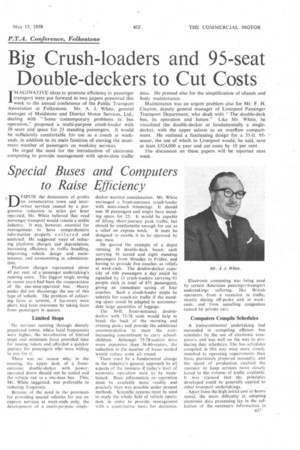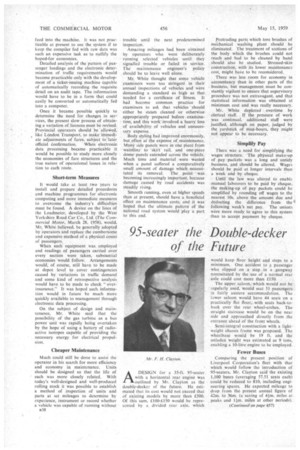Special Buses to Raise and Computers Efficiency
Page 71

Page 72

If you've noticed an error in this article please click here to report it so we can fix it.
ESPITE the diminution of profits on remunerative town and inter urban services caused by a progressive reduction in miles per hour operated, .Mr. White believed that road passenger transport would remain a stable industry. It was, however, essential for management to have comprehensive information properly collated and analysed. He suggested ways of reducing platform charges and depreciation, increasing efficiency in traffic handling, iniproving vehicle design and maintenance, and economizing in administration.
Platform charges represented about 45 per cent. of a passenger undertaking's running costs. The biggest single saving in recent years had been the reappearance of the one-man-operated bus. Heavy peaks did not discourage the use of this type of vehicle. The problem of collecting fares at termini, if lay-overs were short, had been overcome by taking fares from passengers. in queues.
Limited Stops
On services running through densely populated towns, where local frequencies were higher, the introduction of limited stops and minimum fares provided time for issuing tickets and afforded a quicker journey for passengers who were willing to pay for it.
There was no reason why, in the evening, the tipper . deck of a frontentrance double-decker with powerow.frated doors should not be sealed and the vehicle runas a one-man bus. This, Mr. White suggested, was preferable to reducing frequency.
Because of the need in the provinces for providing special vehicles for use on express services at week-ends only, the development of a multi-purpose single decker merited consideration. Mr. White envisaged. a front-entrance crush-loader with semi-coach trimmings. It should seat 38 passengers and might have standing space for 23. It would be capable of lifting short-journey peak traffic, but should be comfortable enough for use as a relief on express work. It must be designed to enable it to be operated by one man.
He quoted the example of a depot running 10 double-deck buses, each carrying 56 seated and eight. standing passengers from Monday to Friday,, and having to provide five coaches as reliefs at week-ends. The double-decker capacity of 640 passengers a day could be equalled by 11 crush-loaders carrying 61 people each (a total of 671 passengers), giving an immediate saving of four coaches. Such a crush-loader might be suitable for coach-air traffic if the standing space could he adapted to accommodate large quantities of luggage.
The 30-ft. front-entrance doubledecker with 73-78 seats would help to break the back of the morning and evening peaks and provide the additional accommodation to meet the everincreasing commitment to carry schoolchildren. Although 73-78-seaters were more expensive than 56-60-seaters, the reduction in the number of buses needed would reduce costs all round.
There must be a fundamental change in the industry's general approach to all aspects of the business if today's level of economic operation were to he maintained. Basic information on operation must be available more readily and precisely than was possible under present methods. Scientific systems must be used to study the whole field of vehicle operation, in order to provide management with a quantitative basis for decisions. Electronic computing was being used by certain American passenger-transport undertakings suffering, like British operators, from a recession in traffic, mainly during off-peaks and at weekends, and from appalling congestion caused by private cars.
Computers Compile Schedules
A transcontinental undertaking had succeeded in compiling efficient bus schedules by the use of electronic cornputors, and was well on the way to producing duty schedules. The bus schedules compiled in this way were more closely matched to operating requirements than those previously prepared manually, and the speed of production enabled the operator" to keep services more closely keyed to the volume of traffic available. Ft was claimed that the principles developed could be generally applied to other transport undertakings.
. Apart from the high initial cost or heavy rental, the main difficulty in adopting electronic data processing lay in the collection of the necessary information to feed into the machine. It was not practicable at present to use the system if to keep the compiler fed with raw data was such an expensive task as to nullify the hoped-for economies.
Detailed analysis of the.pattern of passenger loadings and the electronic determination of traffic requirements would become practicable only With the development of a ticket-issuing machine capable of automatically recordingthe requisite detail on an audit tape. The information would have to be in a form that could easily be converted or automatically fed into a computer.
Once it became possible quickly to determine the need for changes in services, the present slow process of obtaining a variation of licences must be revised. Provincial operators should be alloWed;
like LOndoti. Transport, to immediate adjustments of fares", subject to later official Confirmation. When 'electronic data processing became practicable it would be possible to study more closely the economies of fare structures and the true nature of operational losses in relation to each route.
Short-term Measures It would take at least two years to install and prepare detailed procedures and machine programmes for electronic computing and more immediate measures to overcome the industry's difficulties must be found. A device on the lines of the Loadmeter, developed by the West Yorkshire Road Car Co., Ltd. (The Commercial Motor, March 28, 1958), would, Mr. White believed, be generally adopted by Operators and replace the cumbersome and expensive method of a physical count of passengers.
When such equipment was employed and readings of passengers carried over every section were taken, substantial economies would follow. Arrangements would, of course, still have to be made at depot level to ,cover contingencies caused by variations in traffic demand and some kind of retrospective analysis. would have to be made to check " over7 insurance." It was hoped such information would in future he much more quickly available to management through electronic data processing.
On the subject of design and main. tenance, Mr. White said that the possibility of the gas turbine as a bus power unit was rapidly being overtaken by the hope of using a battery of radioactive isotopes capable of providing the necessary energy, for electrical propulsion.
Cheaper Maintenance
Much could still be done to assist the operator in his search for more efficiency and economy in maintenance. Units should be designed so that the life of each was more closely related. With today's well-designed and well-produced rolling stock it was possible to establish a method of inspection of units and parts at set mileages to determine by experience, instrument or record whether a vehicle was capable of running without a38 trouble until the next predetermined inspection.
Amazing mileages had been obtained by operators who were deliberately routing selected vehicles until they signalled trouble or failed in service. The maintenance engineer's policy should be to leave well alone,
Mr. White thought that some vehicle examiners were too stringent in their annual -inspections of vehicles and were demanding a standard as high as that needed for a certificate of fitness. it had become common practice for examiners to ask that vehicles -should either be 'Steam cleaned or otherwise appropriately -prepared. before examination; and this work involved a heavy' loss of availability of yehicles and unneces
sary expense... .
Body styling had improved enormously, but .ciften at the expense, of .maintenance. Tvhany side panels Were in One piece from waistline to 'skirt rail, and one-piece dome%Panels extended. across the Vehicle: Much time and material -were -wasted when a panel suffered a comparatively small amount of damage which necessitated its removal. The point was becoming increasingly important, because damage caused by road accidents was steadily rising.
Smooth running, even at higher speeds than at present, should have a beneficial effect on maintenance costs, and it was hoped that the ultimate pattern of the national road system would play a part Éø this end. • Protruding parts which tore brushes of mechanical washing plant should be eliminated. The treatment of sections of the body which the brushes could not reach and had to be cleaned by hand should also be studied. Stressed-skin construction, with its lower maintenance cost, might have to be reconsidered., There was less room for economy in • accountancy than in other parts of the business, but management must be constantly vigilant to ensure that supervisory procedure was not extravagant, and that statistical information was obtained at minimum cost and was really necessary.
Mr. White deplored overtime by clerical staff. . If the pressure of work was continual,additional staff were justified, althdugh on paper, judged by the yardstick of Man-hours, they might not appear to be necessary.
Simplify Pay
There was a need for simplifying the wages structure. The physical make-up of pay -packets was a long and untidy business, and should be altered. Wages should be paid at longer intervals than a week arid by cheque.
Until the law was altered to enable manual labourers to be paid by cheque, the making-up of pay packets could be simplified by rounding off wages to the nearest 10s. above the amount due and deducting the difference from the following week's net pay. The unions were More ready to agree to this system than to accept payment by cheque.




















































































































